“How long till we’re home?”
“About 45 minutes.”
A friend had asked the question from the van’s back seat just before what would turn out to be a dirty fuel filter began eroding the vehicle’s performance, most notably reducing its velocity from just-below-a-speeding-ticket to just-above-might-as-well-get-out-and-walk. Nearing the engine’s performance nadir, he inquired again: “How long now?”
“At this speed, about 2 hours.”
“You mean we’re getting further away?”
We know ourselves poorly, others less. Jeremiah’s lamentation on the heart’s deceit attests to the former; the title of Albert Camus’ most famous work, The Stranger, the latter. Secrets are a dirty fuel filter, paradoxically taking us further from those to whom we would draw closer. Building friendship’s shelter on one side sometimes (if not always) buries secrets deeper on the other.
Paul identifies judgment day as “…when, according to my gospel, God judges the secrets of men by Christ Jesus.” Ironically, the secrets we use to transport us away from judgment carry us directly toward it. The more we hide, the more we have to fear.
Per one woman by a well: “I know that Messiah is coming (he who is called Christ). When he comes, he will tell us all things….” So when Jesus confronts her with her most shameful secret, she tells everyone in her village that he told her not that one secret, but “…all that I ever did.” To be known by God erases shame and fear.
We are known by God. David declares not uniquely that his tears and days are recorded in the Deity’s book, but that God knows each of us to the letter, word, page, chapter, and volume—the drafts, erasures, and redactions as well as the final manuscript he meticulously mends. The one who knows everything we think would drive everyone away loves us more closely than any.
This week may those running from his judgment arrive at that love in us, just as we did in him.

